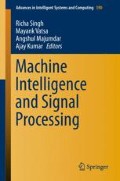Abstract
Existing logistic regression technique applies log-based function on the dataset and provides the necessary result for analysis. It has been for years for prediction analytics. This project develops a genetically modified evolutionary logistic regression technique using radial basis functions (GLR-RBF). This methodology employs three crucial stages. First stage is an evolutionary stage employing two fitness functions. Initially, the dataset obtained from the repository is modified using Genetic Algorithm (GA), followed by creation and simulation of radial basis neural network (RBFNN). The RBFNN is iteratively trained and simulated. The weight matrix generated in each stage is tested with a fitness function, which define the rule for selection of the best individual that will be appended to the dataset. The process of appending the weight matric to the dataset marks the second stage. In the third stage, the new set of covariates is fed into logistic regression operator which classifies the attributes based on effort response variable. This method has been tested in field of remote sensing image classification and other large dataset. This project also tests this technique for software effort prediction, which is regarded as the crucial activity before the commencement of the software development cycle. The model GLR-RBF was found be competitive when compared with similar standard models. The measure obtained from AUC indicates that GLR-RBF has reached the state-of-the-art.
Access this chapter
Tax calculation will be finalised at checkout
Purchases are for personal use only
References
Hervas-Martinez, C., Martinez-Estudillo, F.J., Carbonero-Ruz, M.: Multilogistic regression by means of evolutionary product-unit neural networks. Neural Netw. 14, 201–208 (2004)
Krishnapuram, B., Carin, L., Figueiredo, M.A., Hartemink, A.J.: Sparse multinomial logistic regression: fast algorithm and generalization bounds. IEEE Trans. Pattern Anal. Mach. Intell. 27, 957–968 (2005)
Nabney, I.T.: Efficient training of RBF networks for classification. Int. J. Neural Syst. 14, 201–208 (2004)
Whitehead, B.A., Choate, T.D.: Cooperative-competitive genetic evolution of radial basis function centres and widths for time series prediction. In: IEEE Trans. Neural Netw. 7, 869–880 (1996)
Sentas P., Angelis L., Stamelos, I.: Multinomial logistic regression applied on software productivity prediction. In: Proceedings of the 9th PanHellenic Conference in informatics (2003)
Salem, A.M., Rekab, K., Whittaker, J.A.: Prediction of software failures through logistic regression. Inf. Softw. Technol. Elsevier 46, 781–789 (2004)
Sentas, P., Angelis, L., Stamelos, I.: Software productivity and effort prediction with ordinal regression. Inf. Softw. Technol. Elsevier 45, 17–29 (2005)
Krishnamurthy, S., Fisher, D.: Machine learning approaches to estimating software development effort. IEEE Trans. Softw. Eng. 126–137 (1995)
Papatheocharous, E.: Software cost modelling and estimation using artificial neural network enhanced input sensitivity analysis. J. Univ. Comput. Sci. 1–30 (2012)
Orr, M.J.: Optimising the widths of radial basis functions. In: Proceedings of the 5th Bazillian Symposium on Neural Network, pp. 26–29 (1998)
Chen, S., et al.: Orthogonal least square learning algorithm for radial basis function. In: IEEE Trans. Neural Netw. 2, 302–309 (1991)
Hunt K.J. et al.: Neural network for control system-A survey. In: Automatica 28, 1083–1112 (1992)
Buchtala, O., Klimek M., Sick, B.: Evolutionary optimization of radial basis function classifier for data mining application. In: IEEE Trans. Syst. Man, Cybern., B; Cybern. 35, 928–947 (2005)
Author information
Authors and Affiliations
Corresponding author
Editor information
Editors and Affiliations
Rights and permissions
Copyright information
© 2016 Springer India
About this paper
Cite this paper
Gaur, M. (2016). Genetically Modified Logistic Regression with Radial Basis Function for Robust Software Effort Prediction. In: Singh, R., Vatsa, M., Majumdar, A., Kumar, A. (eds) Machine Intelligence and Signal Processing. Advances in Intelligent Systems and Computing, vol 390. Springer, New Delhi. https://doi.org/10.1007/978-81-322-2625-3_5
Download citation
DOI: https://doi.org/10.1007/978-81-322-2625-3_5
Published:
Publisher Name: Springer, New Delhi
Print ISBN: 978-81-322-2624-6
Online ISBN: 978-81-322-2625-3
eBook Packages: EngineeringEngineering (R0)

